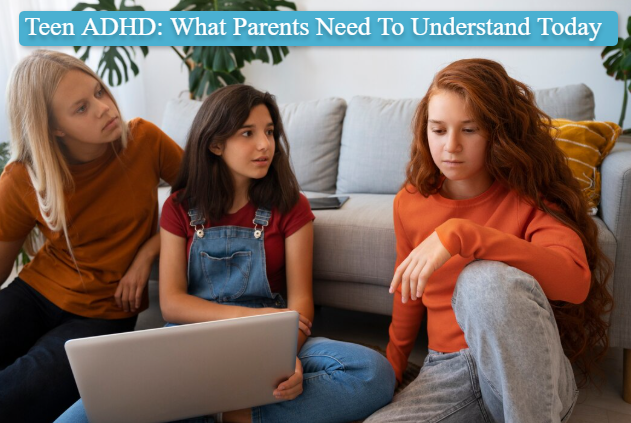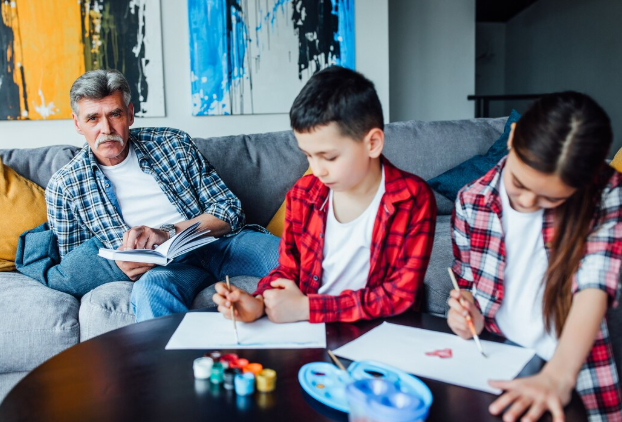Personalized strategies and treatment can help you thrive — let’s explore your options.
Offering guidance and support every step of the way.
Book Now
Raising a teenager is a full-time job. Add ADHD into the mix, and it can feel like you’re working overtime with no days off.
If you’ve just learned that your teen has ADHD, or even if you’ve suspected it for a while, the emotions can be overwhelming. Relief. Confusion. Guilt. Fear. And most of all, a strong desire to help.
We understand.
At Transcending Psychiatry, we work with parents and teens every day. And more often than not, the questions we hear aren’t about schoolwork or attention spans; they’re about connection, communication, and how to make life feel more manageable.
This blog is for you, the parent trying to do your best. Whether you're just beginning to understand ADHD or already exploring strategies for adults with ADHD in your own life, this guide is here to support both your teen and your family.
First, it’s important to understand that ADHD doesn’t start and end in childhood. Many teens who were undiagnosed as kids begin showing symptoms more intensely in middle or high school, and that diagnosis is often the beginning of clarity.
What most parents don’t realize is that adult ADHD is also very common. Many parents of teens we work with eventually begin their own ADHD evaluations after recognizing the same traits in themselves.
Learning how to manage adult ADHD can often give you the tools and insight to better support your teen. In other words, this isn’t just about your child. This might be about your growth, too.
Some teens talk too much, interrupt constantly, or can’t sit still. Others zone out, lose assignments, and seem to live in their head.
ADHD can be hyperactive, inattentive, or both. It’s not about being “bad” or “lazy”; it’s about struggling with executive function skills like focus, memory, organization, time management, and emotional control.
Recognizing your teen’s unique ADHD profile helps you respond with compassion instead of frustration. And if you see similar patterns in yourself, it might be time to explore adult ADHD coping skills or ADHD tips for adults that apply to your parenting and professional life.
One of the hardest parts of teen ADHD isn’t the homework. It’s the meltdowns. The anger. The tears. The explosive frustration that seems to come out of nowhere.
This is called emotional dysregulation, and it’s a central part of ADHD, not just a teenage phase.
Many of the parents we support discover that their teens’ emotional patterns mirror their own, especially if they’ve never been taught how to regulate feelings. That’s when we bring in adult ADHD strategies like grounding, time-outs (for grown-ups too), and how to calm down ADHD in adults and teens using body-based tools.
Learning to regulate your nervous system models what emotional safety looks like and creates space for your teen to co-regulate.
Read More: PTSD Recovery Stages: Healing from Trauma, Step by Step

Many teens with ADHD resist structure, or so it seems. But the truth is, they crave it. They need it. Their brain thrives on it. They just don’t always know how to create it.
As parents, our job is to offer just enough scaffolding without micromanaging. We teach:
Visual schedules
Written to-do lists
Reminders and alarms
Clean, consistent morning and evening routines
Shared calendars for families with ADHD
These aren’t just for teens; they’re ADHD tools for adults, too. When the whole family uses visual and external systems, there’s less conflict, more clarity, and a calmer household overall.
Teens with ADHD often have something called “time blindness.” That means they struggle to perceive time accurately. Ten minutes can feel like two. An hour can disappear without warning.
Sound familiar? A lot of our adult clients say the same.
Time management for ADHD adults and teens is about making time visible. Use color-coded calendars, visual timers, task sequencing, and countdowns. Show time, don’t just speak it.
Pro tip: Practice adult ADHD tools like time-blocking your day, and let your teen see how you do it. Modeling matters more than telling.
Read More: Signs of Depression in Teens You Should Never Ignore
Teenagers with ADHD often feel like they’re constantly messing up. Forgetting things. Getting corrected. Falling behind. Feeling “different.”
That steady stream of negative feedback can quietly destroy their self-worth.
As parents, we must be intentional about celebrating wins, naming strengths, and highlighting growth. It’s not about false praise. It’s about reminding them that ADHD isn’t a character flaw and they’re more than their challenges.
We’ve seen countless teens bloom when their parents also begin working on their inner voice. Learning adult ADHD guidelines and ADHD strategies for adults can change the way you speak to yourself and your child.
One of the most common things we hear from parents is, “I thought I should be able to help them on my own.”
But therapy isn’t about fixing your teen; it’s about giving them a safe space to process, grow, and learn real tools.
We provide:
Individual therapy for teens
Parent coaching
Family counseling
Education around how to manage ADHD in adults, if parents need support, too
Whether you’re looking for how to treat ADD in adults, help with behavior at home, or just someone to talk to, we’re here.
Read More: Uncommon OCD Symptoms You May Be Overlooking
Not every teen with ADHD needs medication, but for some, it can be life-changing.
We walk parents through the pros and cons, answer questions, and help make informed, empowered decisions. And we also support families who prefer holistic or non-medicated approaches.
We believe the best treatment for ADHD in adults and teens is the one that works best for you, whether that’s therapy, coaching, medication, mindfulness, structure, or a mix.
There is no one-size-fits-all plan. That’s why we create a custom ADHD treatment plan for every teen and support adults in doing the same for themselves.

Many of the adults we support grew up thinking they were forgetful, scattered, overly sensitive, or “bad at life.” Now, they’re realizing it was likely undiagnosed ADHD all along.
That’s why we believe deeply in educating caregivers, too.
We offer:
Guidance on how to manage adult ADD
Support for managing adult ADHD at home and at work
Exploration of ADHD triggers in adults and how to respond
Coaching on how to work with ADHD adults and teens together as a unit
Emotional validation for caregivers who are healing while helping
Read More: Understanding Schizophrenia & Schizoaffective Disorder
Supporting your teen means supporting yourself, too. ADHD impacts the whole family, but it also opens the door to deep connection, creative problem-solving, and resilient communication.
If you're ready to explore help with adult ADHD, tools for your teen, or a space where your whole family can breathe easier, Transcending Psychiatry is here.
We’re not here to label. We’re here to listen.
We’re not here to fix. We’re here to understand.
Let’s take this journey together.
We offer in-person services in New Jersey, along with Telehealth services in both New Jersey and New York.
Offering guidance and support every step of the way.
Book Now